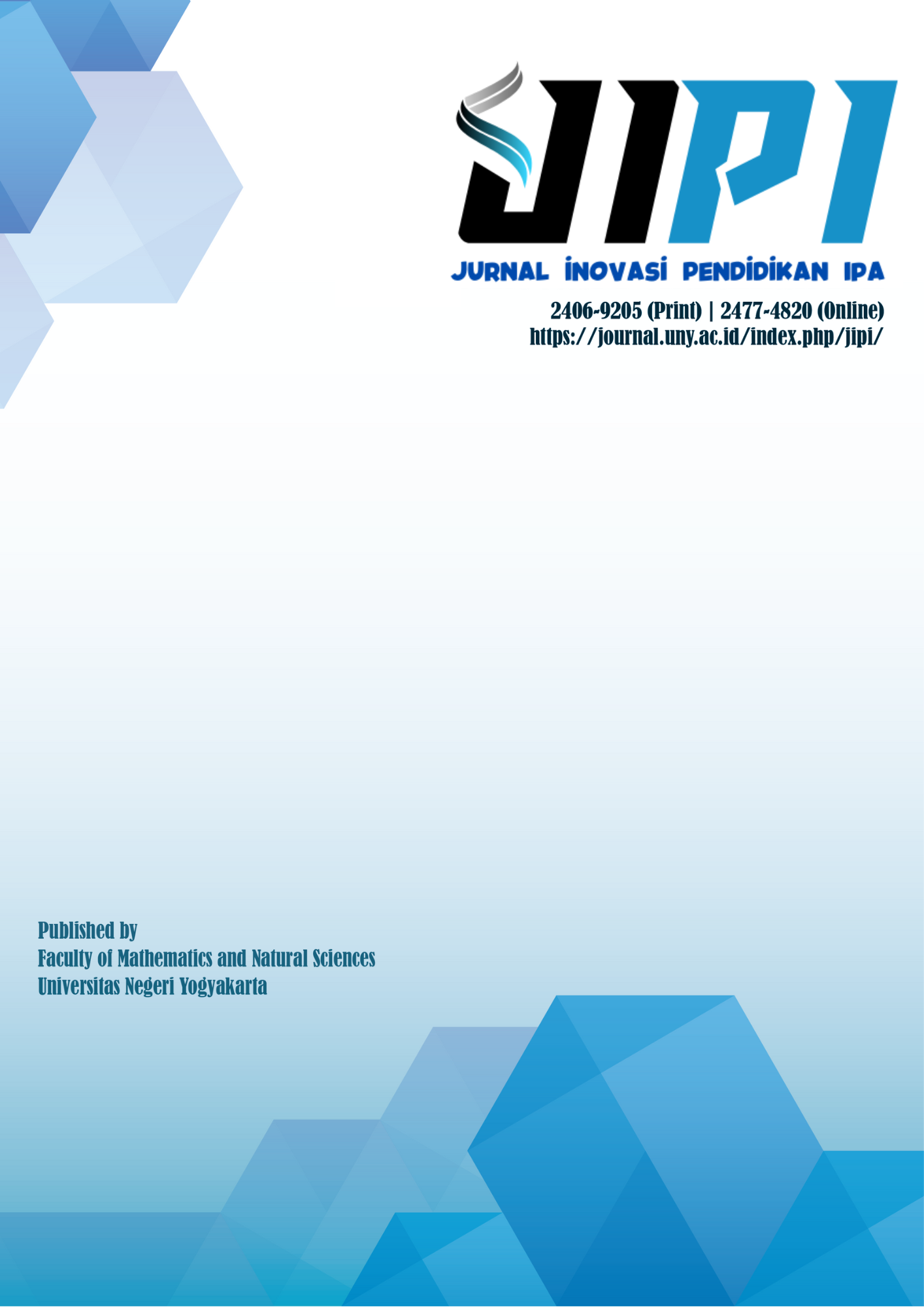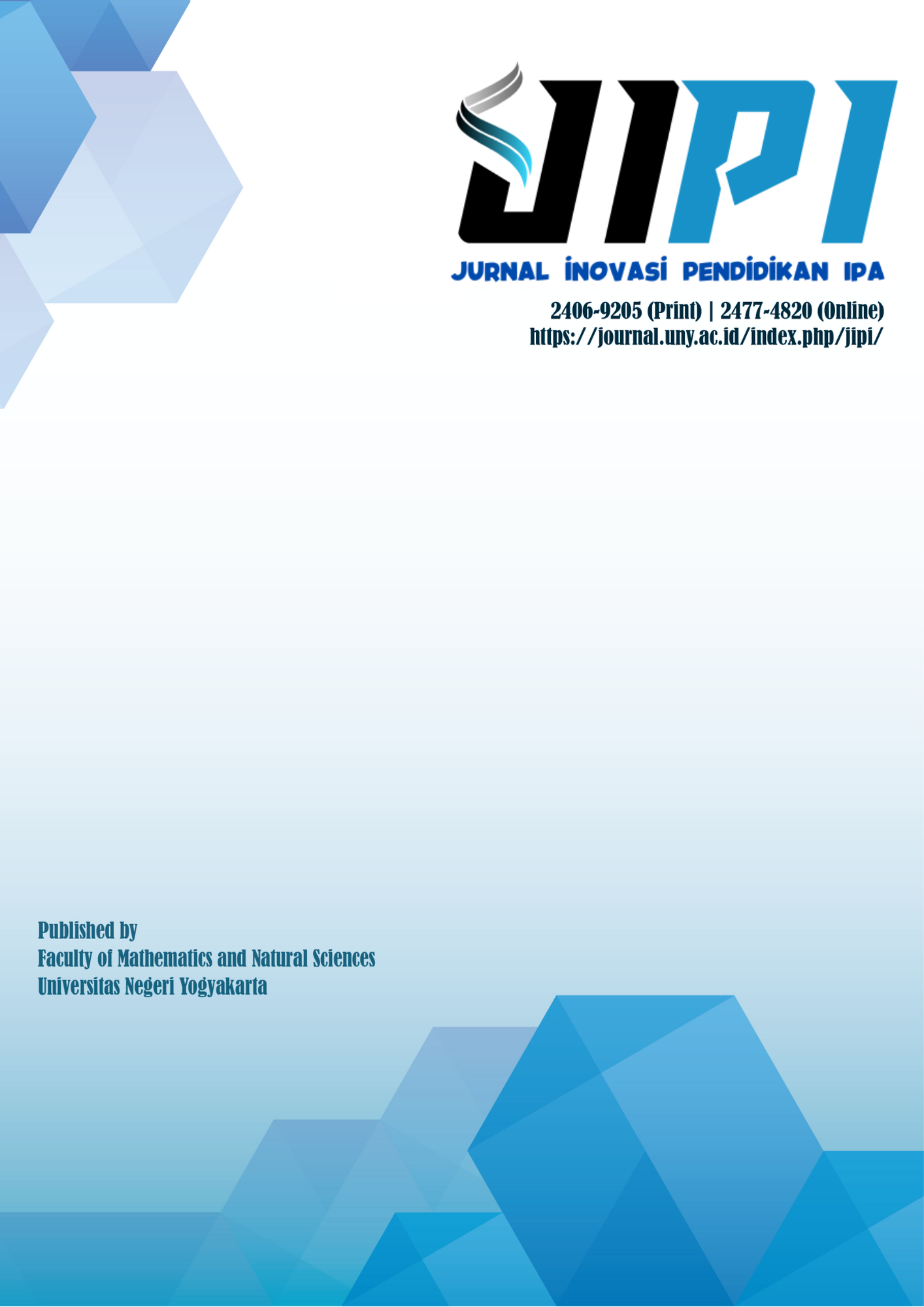An Examination of Students’ Critical Thinking Skills in the Context of the Digestive System
DOI:
https://doi.org/10.21831/jipi.v11i2.82696Keywords:
critical thinking, digestive system, Ennis indicators, science educationAbstract
Critical thinking is vital in education, helping students analyze and evaluate information for better decision-making. However, research on fostering critical thinking in science education remains limited, particularly in topics like the digestive system. The digestive system topic is conceptually rich and closely related to students' daily lives, making it a suitable context to assess critical thinking. This study aims to reveal the essential thinking profiles of junior high school students in Bogor City on the topic of the digestive system, focusing on Ennis’s indicators. A quantitative method was employed, involving 108 students who completed an essay test with five open-ended questions assessing critical thinking across five indicators: providing simple explanations, building basic support, making inferences, offering further explanations, and setting strategies. Participants were selected using purposive sampling, targeting students who had completed the digestive system topic. Semi-structured interviews with three science teachers supplemented the findings. The findings indicated that students demonstrated very low critical thinking abilities, with the lowest scores in providing further explanations (22.83%) and the highest in setting strategies (43.58%) among 108 junior high school students in Bogor. Based on teacher interviews, the current instructional approach predominantly employs lecture-based and textbook-oriented methods, which emphasize factual recall over critical analysis. This traditional approach significantly contributes to students' low performance in essential indicators of thinking. The study offers valuable insights into the challenges and opportunities for fostering critical thinking in science education, highlighting the importance of targeted interventions to address specific deficiencies
References
Aisy, M. R., & Trisnowati, E. (2024). The Effect of the Problem-Based Learning (PBL) Model in the Context of Socio-Scientific Issues (SSI) on Critical Thinking Ability on Digestive System Material. Jurnal Inovasi Pendidikan IPA, 10(2), 185–195.
Alsaleh, N. J. (2020). Teaching critical thinking skills. The Turkish Online Journal of Educational Technology, 19(1), 21–39. https://doi.org/10.4324/9780429342042
Anderson, L., Krathwohl, D., Airasian, P., Cruikshank, K., Richard, M., Pintrich, P., Raths, J., & Wittrock, M. (2001). A Taxonomy for Learning, Teaching, and Assessing: A Revision of Bloom’s Taxonomy of Educational Objectives.
Astaifi, H. (2024). Exploring the impact of project-based learning on critical thinking and soft skills development among Moroccan EFL students. World Journal of Advanced Research and Reviews, 24(01), 1929–1939. https://doi.org/10.30574/wjarr.2024.24.1.3233
Baird, J. R., & White, R. . (2020). Metacognitive strategies in the classroom. Improving Teaching and Learning in Science and Mathematics, May, 190–200.
Bhuttah, T. M., Xusheng, Q., Abid, M. N., & Sharma, S. (2024). Enhancing student critical thinking and learning outcomes through innovative pedagogical approaches in higher education: the mediating role of inclusive leadership. Scientific Reports, 14(1), 1–13. https://doi.org/10.1038/s41598-024-75379-0
Blake, B., & Pope, T. (2008). Developmental Psychology: Incorporating Piaget’s and Vygotsky’s Theories in Classrooms. Journal of Cross-Disciplinary Perspectives in Education, 1(1), 59–67.
Bravo-Torija, B., & Jiménez-Aleixandre, M. P. (2018). Developing an Initial Learning Progression for the Use of Evidence in Decision-Making Contexts. International Journal of Science and Mathematics Education, 16(4), 619–638. https://doi.org/10.1007/s10763-017-9803-9
Bustami, Y., Leliavia, L., Elisabeth, N., Gandasari, A., & Ratnasari, D. (2020). Contextual teaching learnıng in human digestive system: The contribution of critical thinking skills. Biosfer: Jurnal Pendidikan Biologi, 13(1), 101–113. https://doi.org/10.21009/biosferjpb.v13n1.101- 113%0A10.21009/biosferjpb.v13n1.101-113
Chairatunnisa, A., Marlina, L., & Wiyono, K. (2023). Improvement of Critical Thinking Skills of Junior High School Students on Heat Transfer Material. Jurnal Penelitian Pendidikan IPA, 9(11), 10377–10386. https://doi.org/10.29303/jppipa.v9i11.5681
Daff, L., Tame, C., & Sands, J. (2024). A course design approach that encourages reflective practice habits. International Journal of Management Education, 22(2), 100990. https://doi.org/10.1016/j.ijme.2024.100990
Demircioglu, T., Karakus, M., & Ucar, S. (2023). Developing Students’ Critical Thinking Skills and Argumentation Abilities Through Augmented Reality–Based Argumentation Activities in Science Classes. In Science and Education (Vol. 32, Issue 4). https://doi.org/10.1007/s11191-022-00369-5
Duff, J., Cullen, L., Hanrahan, K., & Steelman, V. (2020). Determinants of an evidence-based practice environment: an interpretive description. Implementation Science Communications, 1(1), 1–9. https://doi.org/10.1186/s43058-020-00070-0
El-Soufi, N., & See, B. (2019). Does explicit teaching of critical thinking improve critical thinking skills of English language learners in higher education? A critical review of causal evidence. Studies In Educational Evaluation, 60, 140–162. https://doi.org/10.1016/j.stueduc.2018.12.006
Ennis, R. (2011). Critical Thinking: Reflection and Perspective Part I. Inquiry: Critical Thinking Across the Disciplines, 26(1), 4–18.
Ennis, R. H. (1985). Critical thinking and the curriculum. National Forum: Phi Kappa Phi Journal, 65(1), 28–31.
Facione, P. (2015). Critical Thinking: What It Is and Why It Counts. In Insight assessment (Issue ISBN 13: 978-1-891557-07-1.). Measured Reasons LLC. https://www.insightassessment.com/CT-Resources/Teaching-For-and-About-Critical-Thinking/Critical-Thinking-What-It-Is-and-Why-It-Counts/Critical-Thinking-What-It-Is-and-Why-It-Counts-PDF
Firdaus, M., & Wilujeng, I. (2018). Pengembangan LKPD inkuiri terbimbing untuk meningkatkan keterampilan berpikir kritis dan hasil belajar peserta didik. Jurnal Inovasi Pendidikan IPA, 4(1), 26–40. https://doi.org/10.21831/jipi.v4i1.5574
Hafeez, M. (2021). Project-Based Versus Traditional Lecture Teaching Methods. EDUTEC : Journal of Education And Technology, 4(4), 544–559. https://doi.org/10.29062/edu.v4i4.220
Heard, J., Scoular, C., Duckworth, D., Ramalingam, D., & Teo, I. (2020). Critical Thinking : Skill Development Framework. Australian Council for Educational Research, September 2021, 1–23.
Ho, N., Lien, N., Tinh, N., Hằng, N., & Trang, N. (2018). The Development of Critical Thinking for Students in Vietnamese Schools: From Policies to Practices. American Journal of Educational Research, 6, 431–435. https://doi.org/10.12691/education-6-5-10
Jumariati, Febriyanti, E. R., & Rizki, M. (2021). Argumentation Skills: An Analysis on EFL Students’ Essays Based on Toulmin’s Model of Argument. Proceedings of the 2nd International Conference on Education, Language, Literature, and Arts (ICELLA 2021), 587(Icella), 86–95. https://doi.org/10.2991/assehr.k.211021.013
Kennedy, M. (2021). Cognitive Load Theory: An Applied Reintroduction for Special and General Educators. Teaching Exceptional Children, 56(6), 004005992110482. https://doi.org/10.1177/00400599211048214
Kusumantoro, K., Jaenudin, A., & Sari Melati, I. (2022). Case-Based Interactive E-Module: an Alternative Supplement to Increase Student Learning Motivation. Journal of Education Technology, 6(4), 674–684. https://doi.org/10.23887/jet.v6i4.47254
Kwangmuang, P., Jarutkamolpong, S., Sangboonraung, W., & Daungtod, S. (2021). The development of learning innovation to enhance higher order thinking skills for students in Thailand junior high schools. Heliyon, 7(6), e07309. https://doi.org/10.1016/j.heliyon.2021.e07309
Levy, B. L. M., Thomas, E. E., Drago, K., & Rex, L. A. (2013). Examining Studies of Inquiry-Based Learning in Three Fields of Education: Sparking Generative Conversation. Journal of Teacher Education, 64(5), 387–408. https://doi.org/10.1177/0022487113496430
Main, P. (2021). Blooms taxonomy.
Maulana, R., Susilaningsih, E., Subali, B., & Tipar Bogor, S. (2022). Implementation of Problem-Based Learning Model to Enhance Critical Thinking Skills on Force Material in Fourth Grade Elementary School. Article Info. Journal of Primary Education, 11(2), 274–286. https://journal.unnes.ac.id/sju/index.php/jpe
Maulina, D., Priadi, M. A., & Gustina, M. (2025). Improving Student’s Critical Thinking Skills and Sustainability Awareness using Problem Based Learning Model. Jurnal Pendidikan Sains Indonesia, 13(1), 178–188.
Morris, D. L. (2025). Rethinking Science Education Practices : Shifting from Investigation- Centric to Comprehensive Inquiry-Based Instruction. Education Sciences, 15(1), 73–91. https://doi.org/10.3390/educsci15010073
Nurhasanah, M., Suprapto, P. K., & Ardiansyah, R. (2024). The Effectiveness of Problem-Based Learning Assisted by Articulate Storyline Interactive Students’ Critical Thinking Skills. Jurnal Inovasi Pendidikan IPA, 10(1), 1–9. https://doi.org/10.21831/jipi.v10i1.64847
OECD. (2023). PISA 2022 Results (Volume I): The State of Learning and Equity in Education. In PISA (Vol. 46, Issue 183). OECD Publishing. https://doi.org/10.22201/iisue.24486167e.2024.183.61714
Qablan, A., Alkaabi, A., Aljanahi, M., & Almaamari, S. (2024). Inquiry-Based Learning: Encouraging Exploration and Curiosity in the Classroom (pp. 1–12). https://doi.org/10.4018/979-8-3693-0880-6.ch001
Ragupathi, K., & Lee, A. (2020). Beyond Fairness and Consistency in Grading: The Role of Rubrics in Higher Education BT - Diversity and Inclusion in Global Higher Education: Lessons from Across Asia (C. S. Sanger & N. W. Gleason (eds.); pp. 73–95). Springer Singapore. https://doi.org/10.1007/978-981-15-1628-3_3
Raj, T., Chauhan, P., Mehrotra, R., & Sharma, M. (2022). Importance of Critical Thinking in the Education. World Journal of English Language, 12(3), 126–133. https://doi.org/10.5430/wjel.v12n3p126
Rohani, D. S., & Alimah, S. (2024). The Efect Of Discovery Learning Natural Environment Exploration Model on Digestive System Materials Towards Critical Thinking and Science Process Skills. Journal of Biology Education, 13(1), 55–62. https://journal.unnes.ac.id/journals/ujbe/article/view/4094
Septiany, L. D., Puspitawati, R. P., Susantini, E., Budiyanto, M., Purnomo, T., & Hariyono, E. (2024). Analysis of high school students’ critical thinking skills profile according to Ennis indicators. International Journal of Recent Educational Research, 5(1), 157–167. https://doi.org/10.46245/ijorer.v5i1.544
Sidabutar, N., & Mercuriani, I. S. (2024). Analysis of Critical Thinking Ability of High School Students in Sleman Regency on Virus Material. Jurnal Penelitian Pendidikan IPA, 10(3), 1213–1219. https://doi.org/10.29303/jppipa.v10i3.5320
Sugiyono. (2019). Metode Penelitian Kuantitatif, Kualitatif, dan R&D (3rd ed.). Penerbit Alfabeta.
Supriyati, E., Ika Setyawati, O., Yuli Purwanti, D., Sirfa Salsabila, L., & Adi Prayitno, B. (2018). Profil Keterampilan Berpikir Kritis Siswa SMA Swasta di Sragen pada Materi Sistem Reproduksi Profile of Private High Schools Students’ Critical Thinking Skills in Sragen on Reproductive System. BIOEDUKASI: Jurnal Pendidikan Biologi, 11(2), 74–84. http://dx.doi.org/10.20961/bioedukasi-uns.v11i2.21792
Surma, T., Vanhees, C., Wils, M., Nijlunsing, J., Crato, N., Hattie, J., Muijs, D., Rata, E., Wiliam, D., & Kirschner, P. A. (2025). How Knowledge Matters BT - Developing Curriculum for Deep Thinking: The Knowledge Revival (T. Surma, C. Vanhees, M. Wils, J. Nijlunsing, N. Crato, J. Hattie, D. Muijs, E. Rata, D. Wiliam, & P. A. Kirschner (eds.); pp. 5–35). Springer Nature Switzerland. https://doi.org/10.1007/978-3-031-74661-1_2
Suwono, H., Permana, T., Saefi, M., & Fachrunnisa, R. (2023). The problem-based learning (PBL) of biology for promoting health literacy in secondary school students. Journal of Biological Education, 57(1), 230–244. https://doi.org/10.1080/00219266.2021.1884586
Uluçınar Sağır, Ş., & Kılıç, Z. (2012). Analysis of the Contribution of Argumentation-Based Science Teaching on Student Success and Retention. International Journal of Physics and Chemistry Education, 4(2), 139–156. https://doi.org/10.51724/ijpce.v4i2.103
Umam, A., & Fauziah, Z. N. (2022). Promoting students’ critical thinking skills through project-based learning in Indonesian higher education. JEES (Journal of English Educators Society), 7(1), 110–117. https://doi.org/10.21070/jees.v7i1.1531
Utami, A. D., & Yuliyanto, E. (2020). Concept Map: Does It Increase Learning Motivation of Student? Journal of Science Education Research, 4(2), 49–54. https://doi.org/10.21831/jser.v4i2.35714
Velayati, N., Muslem, A., Fitriani, S. S., & Samad, I. A. (2017). An Exploration of Students’ Difficulties in Using Critical Thinking Skills in Reading. Al-Ta Lim Journal, 24(3), 195–206. https://doi.org/10.15548/jt.v24i3.298
Wale, B. D., & Bishaw, K. S. (2020). Effects of using inquiry-based learning on EFL students’ critical thinking skills. Asian-Pacific Journal of Second and Foreign Language Education, 5(1). https://doi.org/10.1186/s40862-020-00090-2
Yulianing, F. R., Suyono, S., Sukarmin, S., Thoriq, F. N., Auliya, N., & Fauziah, R. U. (2023). Are Argumentation Skills Can Describe Understanding Concepts? International Journal of Current Educational Research, 2(2), 92–105. https://doi.org/10.53621/ijocer.v2i2.241
Zohar, A., & Dori, Y. J. (2003). Higher Order Thinking Skills and Low-Achieving Students: Are They Mutually Exclusive? Journal of the Learning Sciences, 12(2), 145–181. https://doi.org/10.1207/S15327809JLS1202_1
Downloads
Published
How to Cite
Issue
Section
Citation Check
License
Copyright (c) 2025 Jurnal Inovasi Pendidikan IPA

This work is licensed under a Creative Commons Attribution-ShareAlike 4.0 International License.
The authors submitting a manuscript to this journal agree that, if accepted for publication, copyright publishing of the submission shall be assigned to Jurnal Inovasi Pendidikan IPA (JIPI). However, even though the journal asks for a copyright transfer, the authors retain (or are granted back) significant scholarly rights.
Jurnal Inovasi Pendidikan IPA by http://journal.uny.ac.id/index.php/jipi/index is licensed under a Creative Commons Attribution-ShareAlike 4.0 International License.










